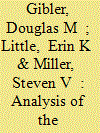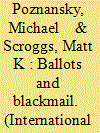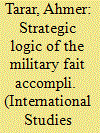| Srl | Item |
| 1 |
ID:
151280


|
|
|
|
|
| Summary/Abstract |
This research note discusses a five-year examination of the original coding work of the Militarized Interstate Dispute (MID) project. After strictly applying MID coding rules, we recommend dropping 251 cases (or over 10% of the dataset), as either we were unable to find a militarized incident in the historical record or the dispute appeared elsewhere in the data. We found evidence linking 75 disputes to other cases, and we could not identify 19 cases in the historical record. Among the remaining disputes, we recommend major changes (changes in dispute year, fatality level, and participants) in 234 disputes and minor changes in 1,009 disputes. We use this article to examine the potential impact of our suggestions on existing studies. Though we identified several systematic problems with the original coding effort, we also find that these problems do not affect current understandings of what predicts the onset of interstate conflict. However, estimates in our replications of three recent studies of dispute escalation, dispute duration, and dispute reciprocation all witness substantial changes when using corrected data—to the point of reversing previous conclusions in some cases.
|
|
|
|
|
|
|
|
|
|
|
|
|
|
|
|
| 2 |
ID:
151281


|
|
|
|
|
| Summary/Abstract |
Does the restraint that prevents pairs of democracies from fighting large-scale wars also prevent them from coercing one another? While scholars have long drawn a bright line between using force and threatening it, the literature on democratic-peace theory overwhelmingly emphasizes the former. Using a dataset uniquely suited for the study of militarized compellent threats, we find that pairs of democracies are significantly less likely to engage in coercive diplomacy than are other types of regimes. We employ a variety of estimators to ensure the robustness of our results; the finding holds in all cases. We also elaborate on several alternative logics that might account for the hypotheses. This allows us to adjudicate between a variety of mechanisms. Our findings reveal that democratic-peace theory has broader applicability than even proponents give it credit for: not only are democracies less likely to fight wars with one another, but they also prove less likely to threaten each other with force.
|
|
|
|
|
|
|
|
|
|
|
|
|
|
|
|
| 3 |
ID:
151282


|
|
|
|
|
| Summary/Abstract |
When trying to change the status quo in their favor, leaders sometimes launch sudden faits accomplis involving the costly, but limited, use of military force. In doing so, they hope that the potential defender accepts the consequences and does not pursue further military conflict. But comparatively little scholarship tries to explain the use of this strategy. I examine the logic for engaging in a fait accompli from within the rationalist bargaining approach to understanding costly military conflict. My analysis identifies informational and commitment problems that can cause a leader to undertake a fait accompli, as well as an informational problem under which the fait accompli can trigger an unwanted war with the potential defender. My model also applies to dilemmas of extended deterrence; it provides some new insights into this area as well. Overall, it helps explain wars that are not preceded by crisis bargaining.
|
|
|
|
|
|
|
|
|
|
|
|
|
|
|
|